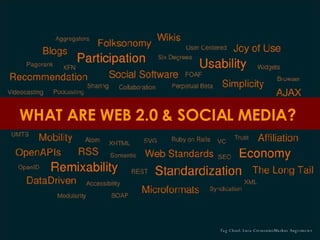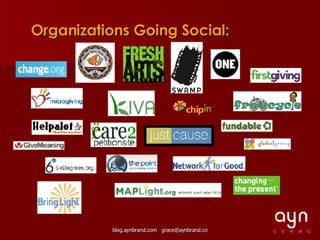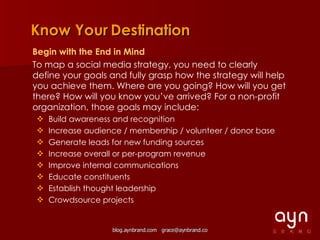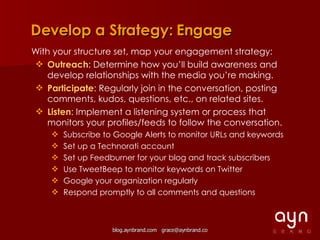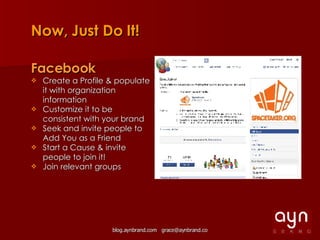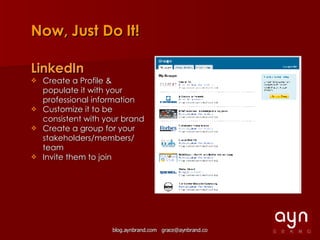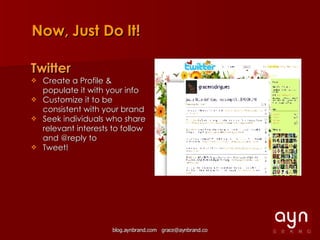AYN Brand : T3 Workshop - Social Media & Web 2.0 Primer
- 1. T3 @ HAA : Web 2.0 & Social Media Primer Presented by: Grace Rodriguez, AYN Brand wordle.net
- 2. This workshop, the first of HAA’s T3 “Tech Tools & Tips” series, will help organizations & individuals answer: 1. What are Web 2.0 and Social Media? 2. Who is using it? 3. Why should I and/or my organization use it? 4. How do I get started? T3 Workshop Series @ Houston Arts Alliance Web 2.0 & Social Media Primer “ The Basics: What? Who? Why? How?”
- 3. WHAT ARE WEB 2.0 & SOCIAL MEDIA? Tag Cloud: Luca Cremonini/Markus Angermeier
- 4. The coining of "Web 2.0" is widely credited to Tim O'Reilly: “… core competencies of Web 2.0 companies:” The Web as Platform – The World is Flat (Thomas L. Friedman) Harnessing Collective Intelligence – Crowdsourcing Data is the Driving Force – Information Economy End of the Software Release Cycle – Perpetual Beta Lightweight Programming Models – Mashups Software above the level of a single device – Virtual Mobility Rich User Experiences – Useful, Engaging, Community-Oriented Web 1.0 was Commerce. Web 2.0 is People. - Ross Mayfield What is Web 2.0?
- 5. What is Social Media? According to Wikipedia: Social media is the use of electronic and Internet tools to share and discuss information and experiences with other people. Social media tools include: networking sites, blogs, microblogs, vlogs, podcasts, forums, wikis, picture/ video/music sharing sites, instant messaging applications, and RSS feeds.
- 6. What is the difference? “ Web 2.0” represents the next generation of Internet companies and technology; “ Social Media” refers to the use of those tools to communicate with other people. Web 2.0 : Social Media :: TV/Cable : Broadcasts
- 7. POPULAR Web 2.0 Tools/SITES: Communication & Community CMS (Content Management System): Drupal, Joomla Blogs: Wordpress, TypePad, Blogger Microblogs: Twitter, Jaiku, Pownce, Tumblr Social Networks: Facebook, LinkedIn, MySpace, Friendster Social Network Aggregators: FriendFeed, Youmeo “ White Label” Social Networks: Ning, KickApps, CollectiveX Crowdsourcing: Wikipedia, PBWiki, crowdSPRING, Kluster, CollabandRate, NameThis Social Bookmarking: del.icio.us, StumbleUpon, Digg, Reddit Opinion sites: epinions, Amazon reviews, Yelp
- 8. POPULAR WEB 2.0 TOOLS/SITES: Multimedia Photo sharing: Flickr, SmugMug, Picasa, Photobucket Video sharing: YouTube, Vimeo Livecasting: Ustream, Justin.tv Audio/Music Sharing: imeem, Last.fm, Pandora, iLike Entertainment Virtual Worlds: Second Life, Active Worlds, IMVU, There Social Gaming: World of Warcraft, Halo, Miniclip.com
- 9. WHO IS USING WEB 2.0? wordle.net
- 10. Who is using it? Nearly half of all online consumers participate in at least one Web 2.0 activity.
- 11. The Numbers: 47% of people’s time on the internet is spent on content; 33% on communicating 91% of users are likely to act on a friend’s recommendation 330 million online video viewers Twitter @ 1 million users and 3 million messages per day LinkedIn @ 19 million users MySpace @ 110 million users 41% of users read blogs Source: Vanina Delobelle, PhD – May 08 0:07:51 1,655 Yahoo! 360° 1:00:10 1,749 MyYearbook 0:02:15 1,887 Buzznet.com 0:16:38 1,900 Meetup.com 0:23:34 2,025 hi5 0:20:33 2,176 Bebo 0:06:57 2,271 Ning 0:03:46 2,622 Last.fm 0:35:58 2,818 AOL Community 0:33:27 2,867 Tagged.com 0:12:03 3,558 Imeem 0:04:09 3,662 Flixster 0:32:47 4,347 Club Penguin 0:01:53 5,539 AOL Hometown 0:04:43 7,481 Reunion.com 0:06:13 8,546 Windows Live Spaces 0:12:52 9,566 LinkedIn 0:08:30 15,451 Classmates Online 1:21:14 29,226 Facebook 2:19:38 59,482 Myspace.com Time/Person Users (000) Top 20 Social Sites, 06/08
- 12. ALL IN: Multigenerational Use Source: Rapleaf Facebook Users 2.6 million users identified: 63% female, 36% male 17%<18 yrs | 52% 18-25 yrs | 21% 26-35 yrs | 5% 36-45 yrs | 5%>45 yrs 2.9 major social networking sites used on average MySpace Users 11.3 million users identified: 63% female, 36% male 20%<18 yrs | 40% 18-25 yrs | 27% 26-35 yrs | 7% 36-45 yrs | 6%>45 yrs 2.4 major social networking sites used on average LinkedIn Users: 0.8 million users identified: 38% female, 61% male 2%<18 yrs | 9% 18-25 yrs | 49% 26-35 yrs | 24% 36-45 yrs | 16%>45 yrs 3.2 major social networking sites used on average Plaxo Users: 1.3 million users identified: 62% female, 37% male 16%<18 yrs | 39% 18-25 yrs | 24% 26-35 yrs | 10% 36-45 yrs | 11%>45 yrs 3.6 major social networking sites used on average
- 13. XYZ: Youth DOMINATES ONLINE Base: US online consumers Source: NACTAS Q4 2006 North American Devices & Access Online Survey, Forrester NACTAS Q4 2006 Youth Media & Marketing And Finance Online Survey Percent of each generation in each Social Technographics® category
- 14. The RenGen *Source: “Decoding Generational Differences” by W. Stanton Smith, Principal, Next Generation Initiatives Short for Renaissance Generation, RenGen was coined by Patricia Martin to identify the new “Cultural Consumer” that has emerged alongside social media. This market comprises people from various age groups who are united by similar psychographics, rather than by traditional demographics: Their world is wired , flat , social , and democratic . They want authenticity , meaning , good design, natural / organic experiences and products . They want to feel connected to a mission* and have fun. They believe strongly in community service * and volunteering for a good cause . They connect through the Web frequently and regularly .
- 15. Case Study: Barack Obama $32 million raised from 275,000 people who gave $100 or less
- 16. The Long Tail 20% The New Way (with a bigger, longer tail) The Old Way (Pareto Principle, or 80/20 rule) Control When Web 2.0 is applied… Source: http://en.wikipedia.org/wiki/The_Long_Tail
- 17. Change is Here! 20% Source: http://en.wikipedia.org/wiki/The_Long_Tail High $ value donors, Smaller distribution Low $ value donors, Larger distribution Control Web 2.0 significantly increases total value contributed/received by aggregating the “long tail” of smaller value donors.
- 19. WHY SHOULD I USE IT? wordle.net
- 20. Social media allows you to effectively engage audiences to: Enhance your image Raise awareness for your organization, programs, and services Share news and event notices Get actionable feedback Build donor, member, stakeholder, and volunteer relationships Develop community around your mission Manage volunteers & staff Research opportunities … all at little-to-no cost, with high ROI in comparison to traditional media. Your only cost is time & dedication! The Future is Social
- 21. Join the Conversation Web 1.0 Web 2.0 Audience Audience YOU YOU Monologue – One Way Mass Broadcast Static No Consumer Community Shotgun Approach: Hard to Target Specific Audiences Hard to Engage Audience Dialogue – Two Ways Personalized Communications Dynamic & Real-time Interactive & Collaborative Rich Data & Interest Groups Allow for Better Targeting Easy to Build Community
- 22. If you don’t have a Web site right now, you are missing out on tapping into the highest concentration of educated, affluent, and socially-conscious people around the world: the Internet users. Many non-profits and artists don’t have the time or resources to invest in developing their own Web sites Free 2.0 tools like blog platforms, content management systems, and white label social networks can help you develop a Web presence quickly, easily, and cheaply. If your primary need is to post basic information and content, and your outreach strategy involves the type of people who are likely to be using specific 2.0 tools, then consider using those same tools to create your Web presence, rather than building a site from scratch. Be Seen: Establish a Web Presence
- 23. Social media is one of the most effective and inexpensive ways to tap into the “long tail” market to develop support for your cause, and to promote your organization, its programs, events, and initiatives. Targeted email newsletters, microblogging platforms like Twitter, and apps like Causes in Facebook, provide you with ways to quickly and easily trigger a “Butterfly Effect” that builds awareness and buzz for: Calls to Action Online Petitions Event Attendance Volunteer Recruitment and Mobilization Organizational Information and Updates Be Heard: Advocate & Promote
- 24. Listen and learn from constituent/audience feedback. Social media is a great way to get candid, honest feedback and provide great constituent/member service. By joining the conversation, you can: Find out what people are saying about your organization Immediately address any issues or criticisms Correct misunderstandings or misconceptions Learn how you can improve programs and services Research VIPs, potential donors, employees, and others. A vast amount of information about people is volunteered on social networking sites. You can use that to research: The history & interests of a potential donor or Board Member The background & affiliations of a potential employee Be Advised: Listen & Learn
- 25. Social media encourages user participation. It’s up to you to “answer the phone” and complete the connection, engaging people in dialogue that enhances audience development, loyalty, and lifespan. Build Relationships with Your Audience Continually share your vision and enthusiasm to develop Brand Ambassadors and Citizen Marketers among current constituents and stakeholders. Look for emergent opportunities to meaningfully communicate your mission with new audiences. Look for ongoing opportunities to recruit and develop potential donors, members, volunteers, and staff. Be a Friend: Build Relationships
- 26. As your social media efforts snowball and spread by Word of Mouth (WOM) around the Web, you develop a community of supporters and advocates, with you positioned as the hub for information and interaction. Become a resource: By providing relevant and useful information for current members and new audiences, they will continue to come back to you for more. Build bridges: By adding ways for people to interact with you, it becomes easier for them to support you. Cultivate culture: By regularly encouraging proactive participation among your audience, you build good habits of “buy-in” and support for your organization. … And it will only cost you time, commitment, & patience. Be a Hub: Build Community
- 27. HOW DO I GET STARTED? wordle.net
- 28. FIRST: Is 2.0 REALLY Right for You? Before committing resources to pursuing a social media strategy or campaign, consider and assess the following: Is your audience online? How willing are you to experiment, take risks, and adapt? Are you ready to face bad news? Platforms like blogs allow for candid comments, both positive and negative, and some organizations aren’t ready to address those opinions. (Avoidance is not a good long-term solution, though!) Do you have enough resources to effectively pursue this? Do you have Board and stakeholder buy-in? Who will manage the strategy/campaign? How will you fit this into people’s day-to-day responsibilities? How will you track and measure results? How long are you willing to give it a try?
- 29. Know Your Destination Begin with the End in Mind To map a social media strategy, you need to clearly define your goals and fully grasp how the strategy will help you achieve them. Where are you going? How will you get there? How will you know you’ve arrived? For a non-profit organization, those goals may include: Build awareness and recognition Increase audience / membership / volunteer / donor base Generate leads for new funding sources Increase overall or per-program revenue Improve internal communications Educate constituents Establish thought leadership Crowdsource projects
- 30. Develop a Strategy: Structure Once you’ve clearly defined your goals, map the strategic path you will take to achieve them. Points to address: Method : Decide on the mix of content you will create, then design your organization’s workflow around it. Community : Determine how you will reach and engage the people you seek to gather around your organization. Communication : Build a central “home” for your communications, whether an aggregator, blog, or CMS. Outposts : Create social network outposts where you can interact with others and share the way to your platform. Design & Linkage : Link all profiles to target audiences, community sites, industry sites, business sites, portals, blogs
- 31. Develop a Strategy: Engage With your structure set, map your engagement strategy: Outreach : Determine how you’ll build awareness and develop relationships with the media you’re making. Participate : Regularly join in the conversation, posting comments, kudos, questions, etc., on related sites. Listen : Implement a listening system or process that monitors your profiles/feeds to follow the conversation. Subscribe to Google Alerts to monitor URLs and keywords Set up a Technorati account Set up Feedburner for your blog and track subscribers Use TweetBeep to monitor keywords on Twitter Google your organization regularly Respond promptly to all comments and questions
- 32. Remember: It’s Social When your strategy is mapped and you’re ready to begin execution, remember to make sure every communication is aligned with your organization’s mission; and focus on the experience and benefits you provide for your audience: It’s not about coffee – it’s about the café culture It’s not about a hog – it’s about a lifestyle It’s not about an event – it’s about sharing a culture It’s not about seats – it’s about an inspiring performance It’s not about heads – it’s about a community of individuals It’s not about education – it’s about helping a child achieve a better future Always keep in mind: On the receiving end of every message you send is a real, live, sentient person – aim to connect !
- 33. Now, Just Do It! Embrace Transparency, Authenticity, and Meaning. Be Transparent : Being open and honest is essential to developing trust among audiences. Many people already approach social media with skepticism. Let people know you have nothing to hide: Adopt a policy of full disclosure. Be Authentic : Let your organization’s culture and character shine through. With so much “spin” bombarding audiences, use your unique voice to let them know you’re the real deal. Make it Meaningful : Remember, this is a conversation, not a business mixer. You want to engage people, not just add emails to a list. Make your communications relevant, useful, on mission, and of real value/benefit for your audience.
- 34. Now, Just Do It! Get Online and Connect with People Visit them where they congregate: In forums? Start discussions. On blogs? Comment to posts. On social networks? Add them as friends. On Twitter? Follow them. Share your mission. Support their interests and causes, and they will return the favor. Create profiles on the social networking sites most relevant for your organization. Make your profile & branding consistent! Search for and reach out to people with similar interests Be Proactive: Share Everywhere! Post videos on YouTube, announce events on Twitter, post comments on Facebook, blog about your organization, etc. Reciprocate support by sharing other people’s videos, tweets, comments, posts, etc., - it’s a two-way street!
- 35. Now, Just Do It! Facebook Create a Profile & populate it with organization information Customize it to be consistent with your brand Seek and invite people to Add You as a Friend Start a Cause & invite people to join it! Join relevant groups
- 36. Now, Just Do It! MySpace Create a Profile & populate it with organization information Customize it to be consistent with your brand Seek and invite people to Add You as a Friend Join relevant Groups
- 37. Now, Just Do It! LinkedIn Create a Profile & populate it with your professional information Customize it to be consistent with your brand Create a group for your stakeholders/members/ team Invite them to join
- 38. Now, Just Do It! Twitter Create a Profile & populate it with your info Customize it to be consistent with your brand Seek individuals who share relevant interests to follow and @reply to Tweet!
- 39. Now, Just Do It! YouTube Create Viral Videos Record Events, Forums Upload them Blog/Tweet and Share
- 40. Now, Just Do It! SlideShare Create Useful Presentations Upload them Blog/Tweet and Share
- 41. THANK YOU! Grace Rodriguez President, AYN Brand grace@aynbrand.com | 713.568.6835 twitter: gracerodriguez | facebook: gracejrodriguez


